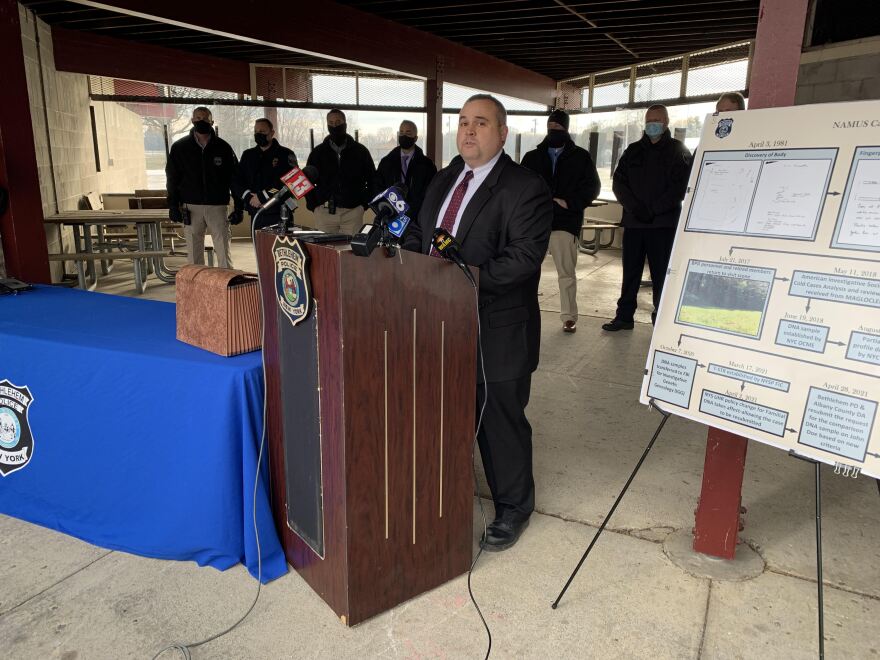Town of Bethlehem Police have solved a cold case nearly 41 years after human remains were discovered in a farmer’s field. Modern genealogical forensic technology is being credited with helping solve the case.
For more than four decades, the identity of human remains discovered in a field was unknown.
Commander Adam Hornick is a member of the Bethlehem Police Department.
“Today’s announcement is both symbolic and historical in many ways. On April 3rd, 1981, the Bethlehem Police Department responded to Vadney Farm in Delmar for a reported discovery of markedly decomposed human remains, which were found at the edge of a farmer’s field adjacent to property of this very park that we’re giving this announcement at today,” said Hornick.
For years, an intensive investigation went nowhere. The body was so decomposed a cause of death could not be determined. What’s more, a flood in at the Bethlehem Police Station in the early 90s destroyed the case file.
The police department decided to reopen the case in 2013, with just two sheets of paper. Hornick led the investigation.
“Through rebuilding the case file, we called on resources of many agencies and entities in and around the Capital Region. After a few years of investigation, our agency was able to locate the jaw bones of the decedent…”
The jaw bones were found in a dentist’s office in Ballston Lake, in Saratoga County. Returned after 36 years, a dental chart was completed, and it was determined the bones matched that of the unidentified body. Then, they were sent for further analysis and a DNA profile was created using advanced technology.
“Shortly after this, with the approval of the Albany County District Attorney’s Office, we submitted the DNA profile for a familial DNA search of the state database. We learned that the request was rejected by the state, as the unidentified human remains policy did not allow for submission of evidence to identify victims, but only for evidence that had been left behind at a scene. Bethlehem Police were determined and did not give up,” said Hornick.
So, the police department began a media push in 2019. And eventually, the state’s DNA familial search law that served as a roadblock was changed. However, still unable to submit the case, the police transferred DNA samples to the FBI’s Investigative Genetic Genealogy unit in Melville, New York.
With the FBI’s help, a lead emerged: two potential family members of John Doe were found.
“The DNA of the aunt and the cousin were sent to the New York State forensic identification center. And based on all of this, we can prove, based on all testimony and physical evidence today, that the confirmed, two DNA samples that the body found on April 3rd 1981, buried in Graceland Cemetery is no longer John Doe, but is, in fact, Franklin Feldman,” said Hornick.
Based on testimony from the relatives, and the objects found on Feldman’s body, the man was determined to be transient with little contact with his family. Nobody reported him missing after he died.
Word that Feldman’s identity would be announced drew some curious neighbors to the police press conference Thursday.
“This was my husband’s father’s farm, this whole park, and we don’t even remember this happening.”
Shirley Winne lives just up the road. She recalls the land where the park is now was once a place where kids built forts.
“My kids had built one, there was one behind the school, there were a bunch of forts out in the field, and this homeless guy was probably residing in them, I would assume,” said Winne.
Bethlehem Police Chief Gina Cocchiara called Thursday’s announcement a major accomplishment in a 41-year mystery.
“Cold cases are unique. And while sometimes they appear to be forgotten about, they’re always being worked on and can…we can find closure to all those that are involved, which I think is paramount to this,” said Cocchiara.



